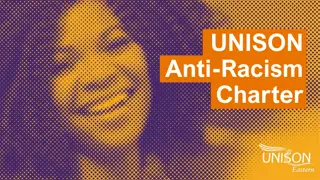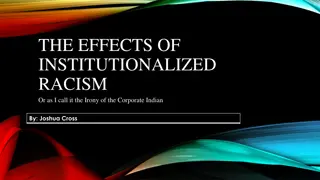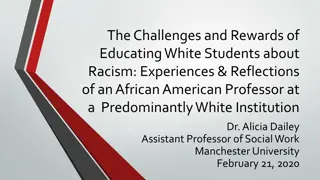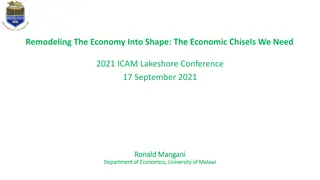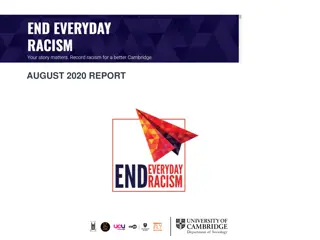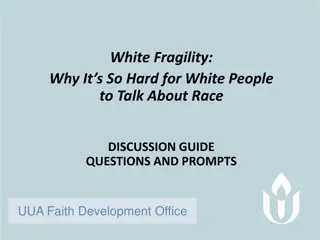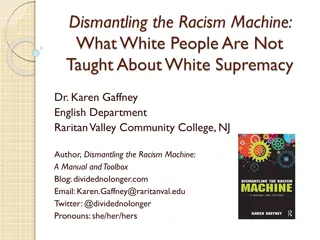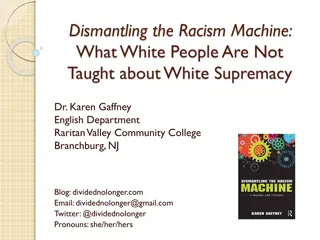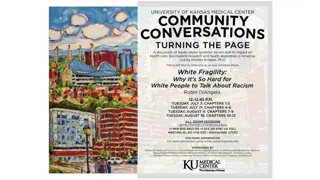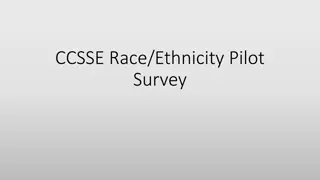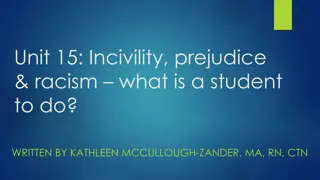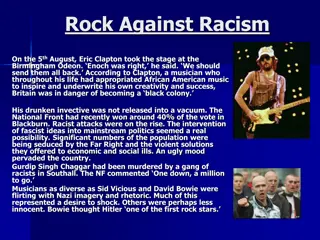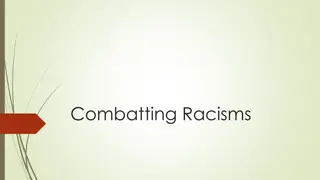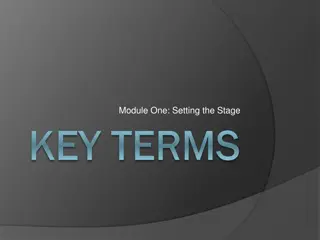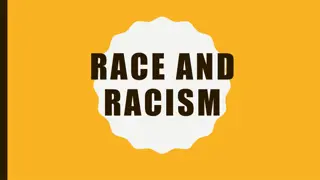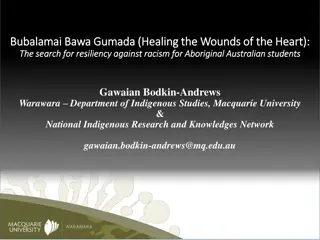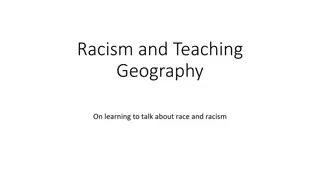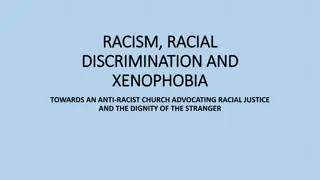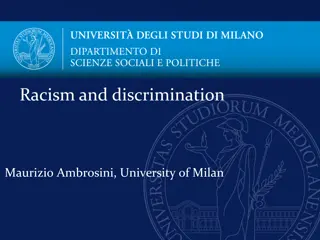Understanding the Challenges of Racism and White Fragility in Community Collaboration
Explore the complexities of racism, systemic issues, and white fragility in community engagement and research collaborations. Delve into the importance of acknowledging white privilege and understanding systemic racism, focusing on the need for white individuals to actively participate in conversations on racism and work towards interrupting the existing systems. Recognize common statements that undermine discussions on race and perpetuate the status quo.
Download Presentation

Please find below an Image/Link to download the presentation.
The content on the website is provided AS IS for your information and personal use only. It may not be sold, licensed, or shared on other websites without obtaining consent from the author. Download presentation by click this link. If you encounter any issues during the download, it is possible that the publisher has removed the file from their server.
E N D
Presentation Transcript
2019 Frontiers Research Day: Community and Research Collaboration Panel Session: Challenges and Successes of Community Engagement and Research Collaborations
White Fragility: Why Its So Hard for White People to Talk About Racism By Robin DiAngelo
Important to Acknowledge I am white. I have a white racial frame. People of color have spent a lot of time thinking, writing, and speaking out about white supremacy and against racism. More white people need to step up to the conversation. For people of color, the book and this discussion will hopefully validate your lived experiences and offer some helpful insight into the challenges of trying to talk to white people about racism. This discussion in a starting point, necessary but not sufficient. Spectrum of learning there is no endpoint. Race talk in the workplace is uncomfortable.
The Primary goal for white people working to understand racism is not to learn how racism impacts people of color, but to recognize how the system of racism shapes our lives, how we uphold that system, and how we might interrupt it. The goal for white people
Dominant definition of racism: intentional acts of racial discrimination committed by immoral individuals. Systemic Racism: a complex network of economic, political, social, and cultural structures, actions, and beliefs that systematize and perpetuate an unequal distribution of privileges, resources and power between white people and people of color. What do you mean when you say racism? A simplistic definition of racism makes us think we are not part of the problem. We feel the need to defend our character rather than explore the inevitable racial prejudices, biases, and stereotypes we have absorbed from living in a culture steeped in racism so that we might change them.
These statements take race off the table, close further exploration, and preserve the status quo: I don t see color. I treat everyone with respect and dignity. People just need to be taught to respect one another, and that begins in the home. I don t care if you are pink, purple or polka-dotted. Race doesn t have any meaning to me. Anyone who works hard in this society can succeed. I work in a very diverse environment. I have people of color in my family. We don t like how white our neighborhood is, but we had to move here for the schools. All lives matter. I went to a very diverse school/ lived in a very diverse neighborhood.
Individualism I am a unique individual and my group memberships, such as race, class, or gender, are irrelevant to my opportunities. Objectivity My experience is a universal/American/human experience and race has nothing to do with it. I just see people as people and race has nothing to do with it. I have not been conditioned with racial bias. Meritocracy - Success and failure are not related to social structures, but come from individual character. Anyone can succeed in this society with hard work, intelligence and skill. Western Ideologies
Post Civil Rights Colorblind Racism - Overt, explicit racism and discrimination is no longer acceptable. - Pretend that we don t see race and racism will end. - Policies and practices adjust to end in the same racial outcomes, but not appear explicitly racist: - Southern strategy , law and order, states rights, forced busing, war on drugs White moral objection to racism increases white resistance to acknowledging complicity with it.
Textbooks Literature Socialized prejudice: Absorption of erroneous or incomplete information, stereotypes and reinforced judgments about other racial groups. Advertising Dominant values Traditions Television Family stories Movies Interpretations News stories Omissions Song lyrics Silences Jokes Socialize d Prejudice
White supremacy: the all-encompassing centrality and assumed superiority of people defined and perceived as white and the system of structural power privileges based on this assumption. Racial breakdown of people who control our institutions in 2016- 2017 Ten richest Americans: 100% white US Congress: 90% white US governors: 96% white Top military advisors: 100% white President and vice president: 100% white US House Freedom Caucus: 99% white Current US presidential cabinet: 91% white People who decide what tv shows we see: 93% white People who decide which books are published: 90% white People who decide which news is covered: 85% white People who decide which music is produced: 95% white People who directed the 100 top-grossing films: 95% white US Teachers: 85% white Full-time college professors: 84% white White Supremacy
There is a difference between agreement and understanding. I don t agree may actually mean I don t understand. A strong opinion is not the same as informed knowledge. We don t have to be aware of racism in order for it to exist. DiAngelo s Guidelines for discussion Fear of making a mistake, or not being able to manage impressions often prevent white people from authentic engagement in the discussion about racism. Choose courage over safety. Putting our effort into protecting rather than expanding our current worldview prevents our intellectual and emotional growth.
Breakout Group - Discussion Questions 1. Identify a passage or a key concept from the book that invokes any sense of discomfort. What does this passage reveal about your socialization? 2. How does it feel to openly discuss the terms racism and white supremacy? Has your understanding of either term changed? 1. Discuss the quote from Ta-Nehisi Coates that race is the child of racism, not the father. 1. How do you think about whiteness? If you are white, how do you think about your whiteness.


